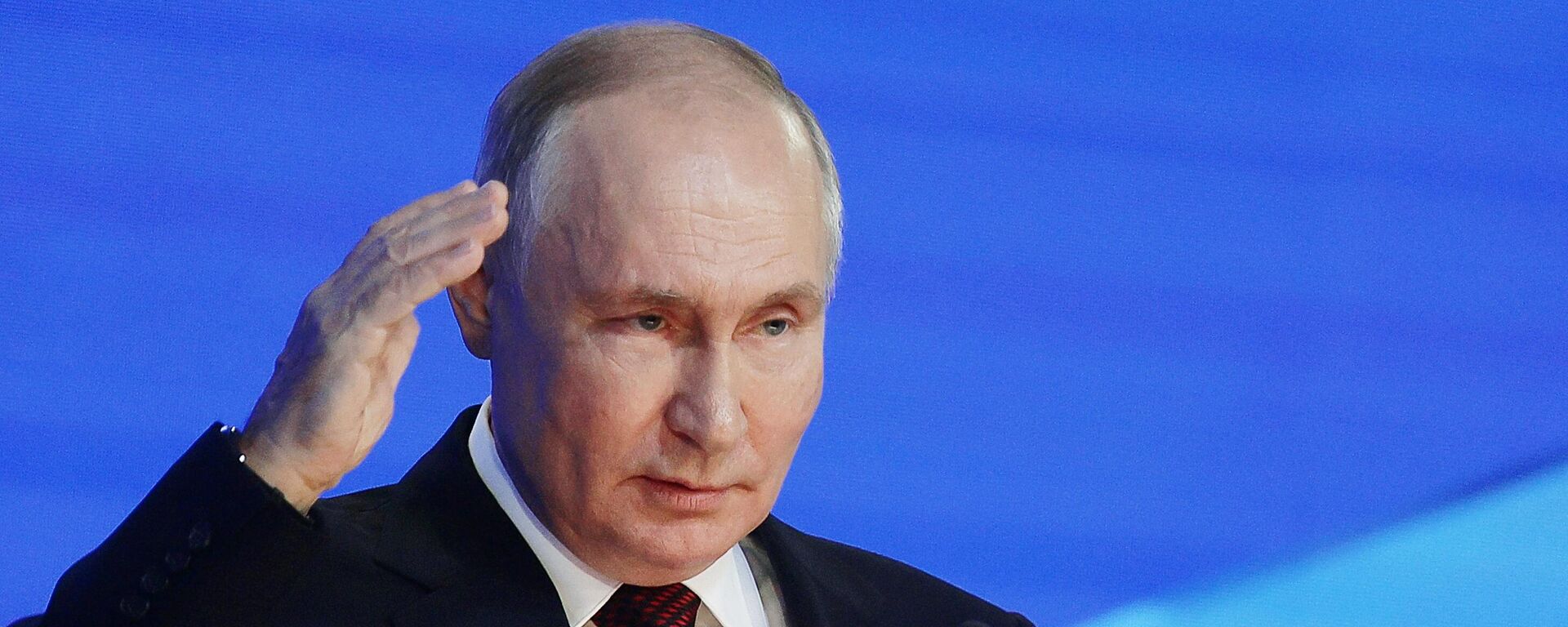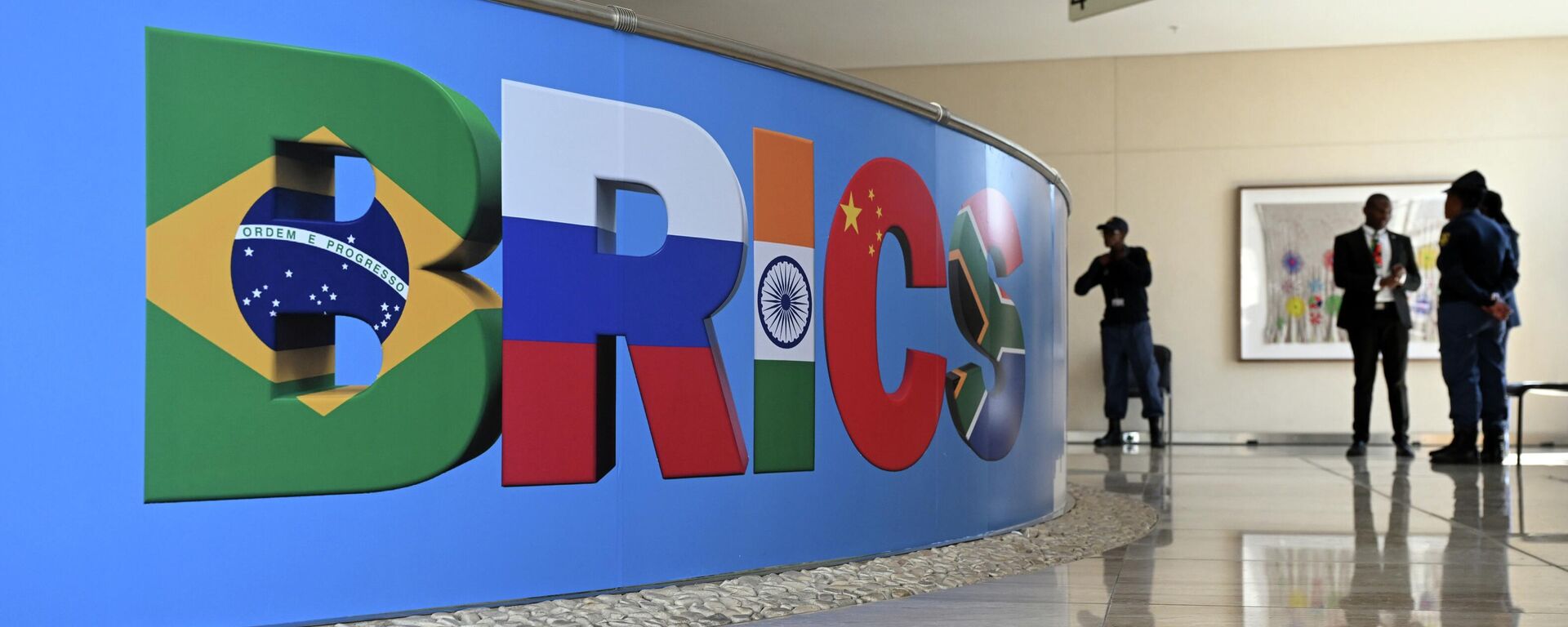https://en.sputniknews.africa/20231007/current-russia-africa-engagements-promise-great-progress-sides-need-to-deepen-conversation-expert-1062601654.html
Russia-Africa Interactions Promise Great Progress But Deeper Conversation Needed: Expert
Russia-Africa Interactions Promise Great Progress But Deeper Conversation Needed: Expert
Sputnik Africa
The 20th annual meeting of the international think tank the Valdai Discussion Club came to an end on October 5. Many important statements were made by Russia’s... 07.10.2023, Sputnik Africa
2023-10-07T14:45+0200
2023-10-07T14:45+0200
2023-10-10T14:13+0200
russia-africa cooperation
russia
pan african youth union
sputnik africa
opinion
ali bongo ondimba
ibrahim traore
china
ethiopia
brics
https://cdn1.img.sputniknews.africa/images/sharing/article/eng/1062601654.jpg?1696940005
Current Russia-Africa engagements promise a lot of progress and both sides need to deepen conversation, Ahmed Bening Wiisichong, Secretary General of the Pan African Youth Union, Africa Head Commonwealth Youth Innovation Hub told Sputnik Africa.The official also noted that it is crucial to understand "the New World Order" and the African youth has always tried to grasp the modern geopolitical situation from the African and the Russian points of view.Commenting on the Valdai Discussion Club, he stressed that everyone were able to share their opinion during the event, which is crucial for "a transparent and open discussion."In addition, the official appreciated the chance to talk to key Russian politicians and their openness during the discussion.Moreover, the expert highlighted that the participants of the meeting were provided with an opportunity to get "a fair understanding" of the Ukrainian conflict and how Russia is coping with the sanctions.'Formidable Force' in World EquationDuring the BRICS Summit, which took place in late August in South Africa, the countries of the bloc accepted the application for membership in the organization of six countries, including two African states, namely Egypt and Ethiopia. The approved countries will become full BRICS members on January 1.Speaking about the pros of the bloc's enlargement for the continent, Bening underscored that given the enhancing cooperation of the African states with BRICS countries, the continent expects the organization to "present itself as a formidable balance and force in the world equation."Furthermore, the official said that it is essential for Africa that the bloc, which unites the world's emerging and developing economies, "is able to come to carry along" the Global South.Continuing the topic, he noted that the inclusion of two more countries of the continent in the organization allow Africa to be "better represented" on the international arena. Bening also highlighted that the acceptance of Ethiopia, where the African Union is hosted, means more cooperation opportunities and implies BRICS becoming "an influential entity," which could "redefine the global financial architecture."According to Bening, Africa wants the bloc "to redefine the financial architecture across the world" as many states of the continent, including Zimbabwe, Eritrea, Sudan and others, suffer from the punitive measures, imposed by the United States.In addition, the expert underlined that coups in Burkina Faso, Niger and other African states signifies that "the political and democratic landscape in Africa has changed" and the peoples of the continent don't want the political landscape to be dictated by certain countries.By the end of this summer, military coups took place in two African countries. In late July, Nigerian President Mohammed Bazoum was overthrown and arrested, and at the end of August, the military ousted the Gabonese President Ondimba. In 2022, a group of military personnel in Burkina Faso, led by Captain Ibrahim Traore, announced the removal of the head of the transitional government of the country and came to power. The countries used to be French colonies.Africa Wants to 'End Imperialism'Commenting on the emerging multipolar world, Bening emphasized that Africa wants "to come as equal players and with a fair chance to express [the] opinions and be able to define [the African] civilization in an equal and non-domineering fashion."Moreover, the expert stressed that with a population of 1.4 billion people Africa "is the single largest economic zone which is the African Continental Free Trade Area, that possesses an excess of 30% of the global industrial natural resource," therefore the continent is a growing world power.The official also noted that the synergy of the African, Russian, Chinese and Indian efforts will significantly change the global order.Western HypocrisyIn 2022, Russian international news agency Sputnik and the RT channel have been banned by the European Union.Speaking about this move of the EU, Bening highlighted that such measures contradicts with the Europe's claimed transparency and freedom of speech.Elaborating on the issue, the official underlined the biased representation of Africa, Russia and China by the West, noting that it also suppresses others "from telling their side of the story."In addition, Bening mentioned that according to data, the citizens of the Western countries "are interested in getting new types of information," therefore Russian news agencies should be able to "tell their side of the story."In conclusion, Bening emphasized that "there is even a dictatorship to prevent your citizens from being able to get other perspectives and then be able to make a value judgment of the information they receive."
https://en.sputniknews.africa/20231006/full-address-of-russian-president-putin-to-valdai-discussion-club-plenary-session-1062581058.html
https://en.sputniknews.africa/20231001/russia-reveals-main-objective-of-its-2024-brics-chairship-1062476975.html
russia
china
ethiopia
west
Sputnik Africa
feedback@sputniknews.com
+74956456601
MIA „Rossiya Segodnya“
2023
Rasina Musallimova
https://cdn1.img.sputniknews.africa/img/07e7/0a/17/1063019139_0:0:646:646_100x100_80_0_0_348c74b69cf86748a53875f8148a2f85.jpg
Rasina Musallimova
https://cdn1.img.sputniknews.africa/img/07e7/0a/17/1063019139_0:0:646:646_100x100_80_0_0_348c74b69cf86748a53875f8148a2f85.jpg
News
en_EN
Sputnik Africa
feedback@sputniknews.com
+74956456601
MIA „Rossiya Segodnya“
Sputnik Africa
feedback@sputniknews.com
+74956456601
MIA „Rossiya Segodnya“
Rasina Musallimova
https://cdn1.img.sputniknews.africa/img/07e7/0a/17/1063019139_0:0:646:646_100x100_80_0_0_348c74b69cf86748a53875f8148a2f85.jpg
russia-africa cooperation, russia, pan african youth union, sputnik africa, ali bongo ondimba, ibrahim traore, china, ethiopia, brics, african union (au), european union (eu), west, youth, africa insight
russia-africa cooperation, russia, pan african youth union, sputnik africa, ali bongo ondimba, ibrahim traore, china, ethiopia, brics, african union (au), european union (eu), west, youth, africa insight
Russia-Africa Interactions Promise Great Progress But Deeper Conversation Needed: Expert
14:45 07.10.2023 (Updated: 14:13 10.10.2023) Longread
The 20th annual meeting of the international think tank the Valdai Discussion Club came to an end on October 5. Many important statements were made by Russia’s president, as well as experts.
Current Russia-Africa engagements promise a lot of progress and both sides need to deepen conversation, Ahmed Bening Wiisichong, Secretary General of the Pan African Youth Union, Africa Head Commonwealth Youth Innovation Hub told Sputnik Africa.
"I think that in the explanations and the engagements that we have, we think that there's a lot of progress ahead and we need to really deepen the conversation for both sides to understand where we stand in terms of social, economic, political and cultural relationships," he said, adding: "Second is that in the entire discussion, we have always been looking out for a value proposition from the Russian side."
The official also noted that it is crucial to understand "the New World Order" and the African youth has always tried to grasp the
modern geopolitical situation from the African and the Russian points of view.
"From a youthful point of view, we have always tried to understand the Russian view of multipolarity first. Second, we've been trying to gauge the geopolitical dynamic from the lenses of an African and the Russian perspective. I think that these discussions are extremely important, giving us a much [more] open and broader perspective of what the New World Order should look like from a Russian point of view and also for us as Africans doing the comparative analysis," Bening revealed.
Commenting on the Valdai Discussion Club, he stressed that everyone were able to share their opinion during the event, which is crucial for "a transparent and open discussion."
In addition, the official appreciated the chance to talk to key Russian politicians and their openness during the discussion.
"I think it's been very open, inclusive, giving everybody an opportunity to express their views. And that's an important hallmark for a transparent and open discussion. Second is the quality of the dignitaries that engage us. I think that we've had an opportunity to engage with key figures within the Russian political space. And they have been very open in terms of how they discuss and engage with us," Bening shared his impression.
Moreover, the expert highlighted that the participants of the meeting were provided with an opportunity to get "a fair understanding" of the
Ukrainian conflict and how Russia is coping with the sanctions.
"We had an opportunity to ask as many questions as we could and also to have a fair understanding of how Russia is confronting the sanctions and how they're analyzing the war in Ukraine. So I think that largely it's been very productive, giving us an opportunity to have a better understanding of the situation within Russia," he underlined.
'Formidable Force' in World Equation
During the BRICS Summit, which took place in late August in South Africa, the countries of the bloc accepted the application for membership in the organization of six countries, including two African states, namely Egypt and Ethiopia. The approved countries will become full BRICS members on January 1.
Speaking about the pros of the bloc's enlargement for the continent, Bening underscored that given the enhancing cooperation of the African states with BRICS countries, the continent expects the organization to "present itself as a
formidable balance and force in the world equation."
"I think that there are a couple of issues that we really need to consider. And for us in Africa, that is how we view it. Currently, the fastest growing economic partners that we have as a continent are from the BRICS countries - Russia, China, Brazil and India. And so our expectations really are two things, one, how BRICS is able to present itself as a formidable balance and force in the world equation," he emphasized.
Furthermore, the official said that it is essential for Africa that the bloc, which unites the world's emerging and developing economies, "is able to come to carry along" the Global South.
"Second, within the geopolitical landscape, how BRICS is able to come to carry along the rest of the world, especially the global South. Because if you look at BRICS, BRICS is a forum that brings together emerging and developing countries. And that means that for us in the global South, that's extremely important because the entire conversation is about economy, is about what our place is in the entire geopolitical composition and the new world order. And so that's what we are looking at," the expert explained.
Continuing the topic, he noted that the inclusion of two more countries of the continent in the organization allow Africa to be
"better represented" on the international arena. Bening also highlighted that the acceptance of Ethiopia, where the African Union is hosted, means more cooperation opportunities and implies BRICS becoming "an influential entity," which could "redefine the global financial architecture."
"The third and final point for me is that, yes, we are excited that two more countries from Africa are joining BRICS. That gives us a voice for a better representation. I'm particularly excited that Ethiopia has been invited to join, and the reason being that the African Union itself is hosted in Addis Ababa. It's a growing economic powerhouse within the continent. And so we are looking at not just having countries joining BRICS but BRICS being an influential entity to change the entire narrative and global dynamics, and also even be able to redefine the global financial architecture," the official underlined.
According to Bening, Africa wants the bloc "to
redefine the financial architecture across the world" as many states of the continent, including Zimbabwe, Eritrea, Sudan and others, suffer from the punitive measures, imposed by the United States.
"Because among all the list of countries that are in the functions of the US, quite a number of them are African countries. We have Zimbabwe on one side, we have Eritrea, Sudan and a couple more that are on the sanctions list. And so we want BRICS to be able to redefine the financial architecture across the world," he explained.
In addition, the expert underlined that coups in Burkina Faso, Niger and other African states signifies that "the political and democratic landscape in Africa has changed" and the peoples of the continent don't want the political landscape to be dictated by certain countries.
"And just to conclude, if we look at the major political situation in Africa, you have a coup in Burkina Faso, Niger, Guinea. It means that the political and democratic landscape in Africa has changed. We don't want that changing political landscape to be defined by a particular segment or unit of the world. We want Africa to be viewed as one that is decolonizing and also fighting neocolonialism," the official underscored.
By the end of this summer, military coups took place in two African countries. In late July, Nigerian President Mohammed Bazoum
was overthrown and arrested, and at the end of August, the military ousted the Gabonese President
Ondimba. In 2022, a group of military personnel in Burkina Faso, led by Captain
Ibrahim Traore, announced the removal of the head of the transitional government of the country and came to power. The countries used to be French colonies.
Africa Wants to 'End Imperialism'
Commenting on the
emerging multipolar world, Bening emphasized that Africa wants "to come as equal players and with a fair chance to express [the] opinions and be able to define [the African] civilization in an equal and non-domineering fashion."
"We want an end to imperialism. And when I say so, I think that it's the cry for everybody not just limited to Africa but the entire Global South, because the biggest challenge of what we are experiencing today is imperialistic tendencies and other people thinking that their civilization and their opinions must supersede the interests and opinions of other people. And that's what we are as Africans are looking forward to seeing moving forward," he added.
Moreover, the expert stressed that with a population of 1.4 billion people Africa "is the single largest economic zone which is the African Continental Free Trade Area, that possesses an excess of 30% of the global industrial natural resource," therefore the continent is a growing world power.
The official also noted that the synergy of the African, Russian, Chinese and Indian efforts will significantly
change the global order."And so a combined effort between Africa and a country like Russia or the BRICS bloc fundamentally changes the equation because everything that countries need to develop or create welfare is right in Africa. And I know Russia does have that, but if you look at the kind of impetus that China and India bring on in terms of technology and in terms of even numbers in economic prowess, I think that that combined effort is going to fundamentally change the equation," he said.
In 2022, Russian international news agency Sputnik and the RT channel
have been banned by the European Union.
Speaking about this move of the EU, Bening highlighted that such measures contradicts with the Europe's claimed transparency and freedom of speech.
"I think that defeats the entire narrative of transparency and freedom of association and speech and all that, because, look, you cannot say you are tolerant, and you don't want to hear the opinions of other people you cannot say it. Because if you look at the entire media landscape, the reason that countries like China, Russia and even the African continent are suffering is because of the most unfair reportage from the West, because they tell you what you need to hear, and they see all the bad things about us," the expert revealed.
Elaborating on the issue, the official underlined the
biased representation of Africa, Russia and China by the West, noting that it also suppresses others "from telling their side of the story."
"Come to Africa. They still define Africa as a big jungle with uncivilized dictators sitting there. They tell us about all the bad things about Russia not being democratic, not being open and free. They tell us about China being a dictatorship, and then on the other side they are suppressing other people from telling their side of the story. I think that is where hypocrisy comes into the equation, and that is where even our colleagues in Europe, the citizens, must begin to rise to the occasion," he emphasized.
In addition, Bening mentioned that according to data, the citizens of the Western countries "are interested in getting new types of information," therefore Russian news agencies should be able to "tell their side of the story."
"I read statistics, where even within Europe and America, the media there has got a very low interest from citizens. 20% is a vote of no confidence. And that means that their citizens are interested in getting new types of information, different perspective from other reporters. And I think that Sputnik and Russia Today should be allowed and given the opportunity to tell their side of the story so that the citizens can have a fair opportunity to weigh," the expert underlined.
In conclusion, Bening emphasized that "there is
even a dictatorship to prevent your citizens from being able to get other perspectives and then be able to make a value judgment of the information they receive."



